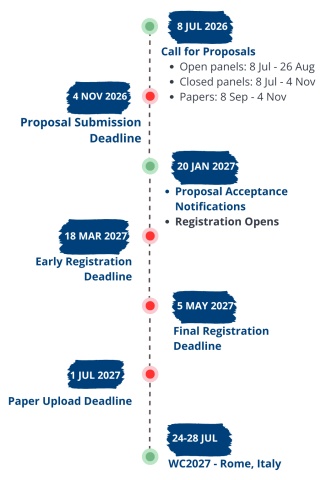
As a scientific association with over 4,500 members worldwide, we are pleased to organize the 29th IPSA World Congress in Rome for the second time since 1958. Rome, with a history spanning over two thousand years, is regarded as the world's first great modern metropolis. The city played a pivotal role in shaping the artistic and cultural heritage of Western civilization. UNESCO designated Rome's entire historic center as a World Heritage Site in 1980, celebrating iconic landmarks such as the Colosseum, the Pantheon, the Trevi Fountain, the Roman Forum, the Palatine Hill, and many others.
The 2027 IPSA World Congress will be organized from 24-28 July 2027 in collaboration with LUISS Guido Carli and the Società Italiana di Scienza Politica (SISP). The Congress program will be developed under the guidance of Program Co-Chairs Vanessa Elias de Oliveira (Brazil) and Francesca Longo (Italy), under the theme Uncertain Democracies: Rethinking Governance in a Changing Global System. Please click here to learn more about the Program Co-Chairs.
Stay tuned for more exciting news about the 2027 IPSA World Congress in Rome!
Important Dates

THEME | Uncertain Democracies: Rethinking Governance in a Changing Global System
In a world marked by rapid and uncertain geopolitical shifts, economic disruptions, and technological revolutions, democracy finds itself at a crossroads. Traditional governance structures are under strain as a result of rising populism, digital authoritarianism, the erosion of social rights and public services provisions, the rising ride of human migration and the consequent growing of multiethnic societies. What’s more, non-state actors now assume many of the functions previously provided by State and public institutions. As a result, private actors are wielding greater political influence, albeit without the accountability typically demanded of their public counterparts.
Furthermore, the global power structure is undergoing dramatic changes, with a host of factors exerting a strong and direct effect on global and national democracy. These include the emergence of new international actors, tectonic changes in the political landscape in powerful and influential countries, specifically in regard to key global issues; the weakening of multilateralism, the crisis of international organizations, and the influence of populism and extreme nationalist movements on global climate change and immigration policies. Likewise, the quality of democracy is under threat from rising economic inequality, both nationally and globally.
These challenges have given rise to an erosion of public trust in democratic institutions and led to an anti-democratic populist backlash in consolidated democracies and difficulties in consolidating emerging democracies.
The rapid advancement of the “AI revolution” poses significant and unprecedented challenges to traditional democracy. Its potential to generate misinformation and deception and to impact democratic processes is far-reaching, yet States are ill-prepared to deal with the consequences. That said, AI tools can also be viewed as opportunities for innovation and for addressing issues that conventional politics has failed to adequately resolve.
Democracies continue to rely on centuries-old institutions, processes, procedures and practices. Can democracy and its traditional methods endure amid ongoing uncertainties, or are new institutional and political models required to meet current challenges?
As nations navigate an increasingly multipolar and changing world, key questions arise: How must democracy evolve to remain relevant and resilient in the new global order? How can democracy refine its strategies in response to the complexities of national and international society? Is democratic governance of the international system even possible?
We actively encourage proposals and dialogues on these topics with the aim of identifying new categories and frameworks for understanding the current context, debating innovative models of democratic governance, examining current transformations within national democracies, recognizing potential avenues for the modernization of democracy, and identifying democratic governance solutions on a global scale.
From this perspective, the IPSA World Congress 2027 calls the political science community to carry out systematic analysis and rethink local, national and global democratic governance in the 21st Century. Discussion topics will include innovations in democracy, such as deliberative democracy, and efforts to monitor democracy and participatory processes that promote civic participation in political decisions. These and other forms of democratic innovation should be analyzed with an eye to fostering and renewing political participation. Additional topics of debate will include the role of new actors and processes in distinct political contexts, the recalibration of democratic systems in response to the impact of artificial intelligence on governance, the influence of social media in shaping public opinion, the increasing interference of private actors in national democratic procedures, the spread of misinformation and its impact on democratic processes, and the urgent need for inclusive institutions and policies that reflect 21st century realities and social needs.
The conference invites the global political science community to discuss these topics, explore innovations in democratic institutions and practices in response to emerging global challenges to democracy, and determine how to achieve more resilient and democratic societies around the world. Participants will look at how these factors are reshaping politics, public policies, public engagement and government accountability, offering perspectives on how societies can adapt democratic institutions to better reflect the needs of diverse communities, with a focus on both the theoretical and practical dimensions of democratic renewal.
Vanessa Elias de Oliveira (Brazil) and Francesca Longo (Italy), Program Co-Chairs











